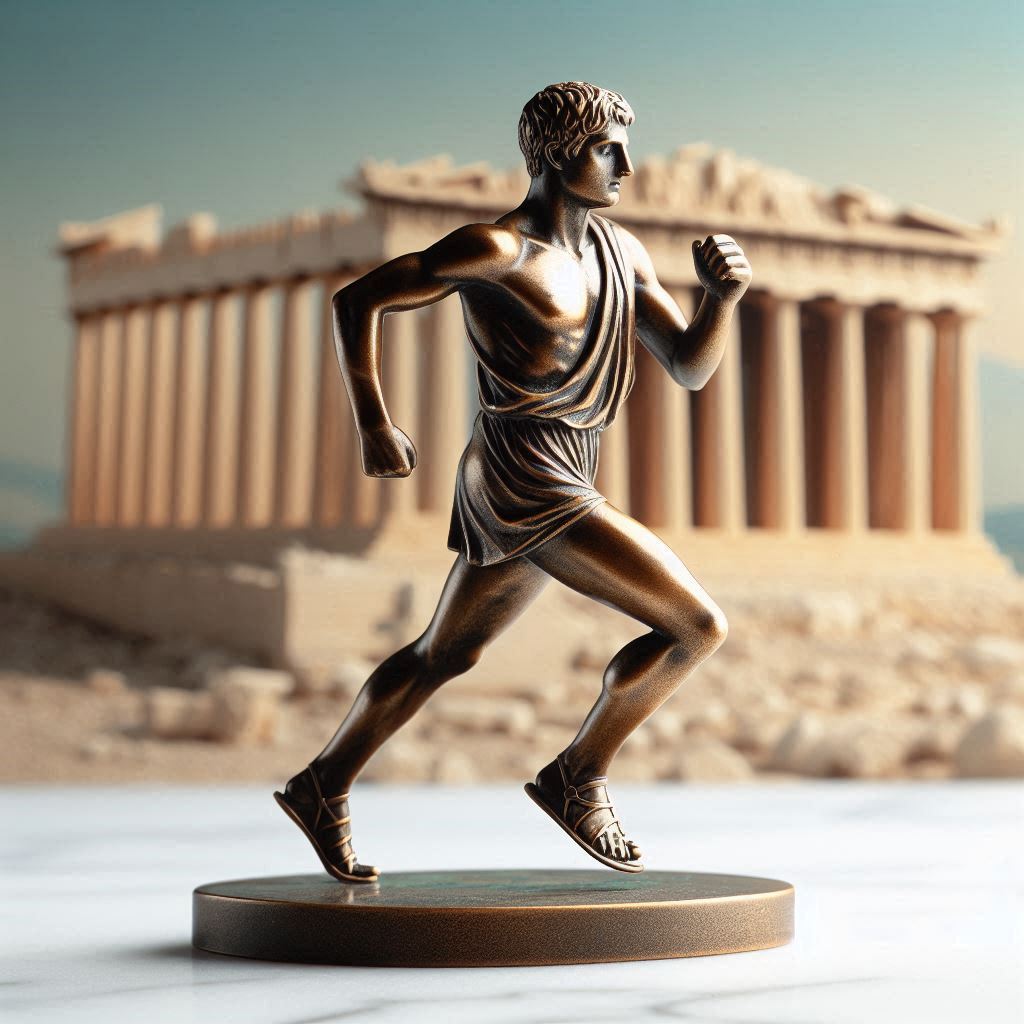Introduction
The marathon is one of the most iconic long-distance races in the world, known for pushing the limits of human endurance. But what many runners may not realize as they lace up their shoes is that the marathon’s origins are rooted in both legend and history, dating back to ancient Greece over 2,500 years ago. This is the story of the first marathon, a tale of heroism, battle, and a messenger who gave everything to deliver a message that would change the course of history.
The Battle of Marathon: A Turning Point in Greek History
In 490 BCE, the ancient city of Athens faced a grave threat. The mighty Persian Empire, under King Darius I, had set its sights on Greece, seeking to expand its already vast dominion. The Athenians, greatly outnumbered and lacking allies, were left to defend their homeland from the invading Persian forces.
The battle took place on the Plain of Marathon, a coastal region about 26 miles (42 kilometers) northeast of Athens. Under the command of Miltiades, the Athenian general, a small yet highly disciplined army of around 10,000 hoplites (Greek soldiers) prepared to face the Persian army, which numbered as many as 25,000 men.
Despite the odds, the Athenians devised a strategy to trap and outmaneuver the Persian forces, leading to an incredible victory. The defeat of the Persians at the Battle of Marathon was not just a military success—it was a defining moment in Greek history, safeguarding the future of Athens and its democratic ideals, which would later influence Western civilization.
Pheidippides: The Legendary Messenger
According to Herodotus, the ancient Greek historian, the Athenians sent a runner named Pheidippides to request help from the Spartans before the battle. Pheidippides covered roughly 150 miles (240 kilometers) in two days to reach Sparta, only to find out that the Spartans were unable to help immediately due to a religious festival. Despite this setback, Pheidippides raced back to Athens with the message, showing immense endurance.

However, the most famous version of the story comes from later accounts (not from Herodotus but from the Roman writer Plutarch and others), which tell of a different, final run. After the Greeks won the Battle of Marathon, Pheidippides was said to have been sent back to Athens to announce the victory. He ran the full 26 miles from Marathon to Athens without stopping, bursting into the Athenian assembly with the words, “Νενικήκαμεν!” (“We have won!”). According to legend, he collapsed and died from exhaustion immediately afterward.
While the historical accuracy of Pheidippides’ legendary run from Marathon to Athens is debated, it has nevertheless become an enduring symbol of endurance, sacrifice, and the spirit of victory.
From Legend to Modern Marathon: The Revival
The modern marathon race was inspired by this ancient tale of Pheidippides and his heroic run. It wasn’t until the late 19th century, however, that the marathon became an organized event.
In 1896, the first modern Olympic Games were held in Athens, and the organizers sought a way to honor the history of ancient Greece. The idea to include a marathon race, modeled after the legendary journey from Marathon to Athens, was proposed by French historian Michel Bréal, with the support of Pierre de Coubertin, the founder of the modern Olympics.
The first Olympic marathon, run on April 10, 1896, was approximately 40 kilometers (24.85 miles), slightly shorter than today’s marathon. The race was won by Spyridon Louis, a Greek water carrier, who became a national hero for his triumph.

The Standard Marathon Distance: Why 26.2 Miles?
Originally, the marathon distance varied in early races, but it wasn’t until the 1908 London Olympics that the official distance of 26.2 miles (42.195 kilometers) was established. The race was originally set to be 26 miles, but an additional 0.2 miles was added so that the race could start at Windsor Castle and finish in front of the royal family’s viewing box at White City Stadium. This quirky extension stuck, and the official marathon distance has been 26.2 miles ever since.
Interesting Marathon Facts
- First Woman to Officially Run the Boston Marathon: In 1967, Kathrine Switzer became the first woman to officially run the Boston Marathon, despite attempts to physically remove her from the race. Her determination paved the way for women in long-distance running.
- World Records: The men’s world record for the marathon, as of 2023, is held by Eliud Kipchoge of Kenya, who ran the Berlin Marathon in 2:01:09. Kipchoge is also the first person to run a sub-2-hour marathon (1:59:40) in a special event in Vienna in 2019, though this time is not recognized for official record purposes.
- Largest Marathon in the World: The New York City Marathon is the world’s largest marathon, with over 50,000 finishers each year.
- The Oldest Marathon: The Boston Marathon, established in 1897, is the world’s oldest annual marathon, taking place every year on Patriots’ Day in April.
The Legacy of Pheidippides
Though historians debate the literal truth of Pheidippides' run from Marathon to Athens, the spirit of his journey lives on in every marathoner who steps up to the starting line. What began as a desperate dash to deliver news of victory has evolved into a global celebration of human endurance. From the battlefields of ancient Greece to the streets of today’s cities, the marathon is a testament to how far we are willing to push ourselves—both physically and mentally.
The next time you see a marathon, or perhaps run one yourself, remember the story of Pheidippides and the victory he carried in his heart. Whether fact or legend, his spirit runs through every mile.
Conclusion
The marathon may have started as a tale of battle and sacrifice, but it has grown into a race that represents perseverance, endurance, and triumph. Every runner who crosses the finish line continues the legacy of Pheidippides, reminding us all that even in the face of overwhelming odds, we have the strength to carry on.
Interest in Greek mythology and history? Click here
© 2024 Sirioti Jewelry. All Rights Reserved.


